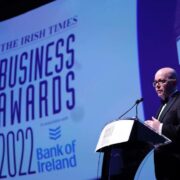The strategic shifts tech giants are making to accommodate the age of GenAI are almost complete and by 2025 GenZ will represent 25% of the workforce, says Prosperity’s Gary Mullan.
As the spectre of tech job cuts still haunts the sector in Ireland with news of cuts at TikTok in Dublin, overall the tech and digital sector is continuing to grow with the sector tipped to rebound in the next quarter.
According to the Prosperity Recruitment 2024 employment and salary survey for Ireland’s digital sector, salaries stagnated across all 140 job categories with only performance marketing roles seeing a modest increase of 5% compared with the previous year.
“That ‘year of efficiency’ mindset lingers into 2024, and we continue to see layoffs – this is due to high interest rates and the strategic moves to adapt to the AI era”
Agency salaries are also trending flat with the exception of PR and Paid Media roles where in some cases there have been increases of up to 6%.
Animation salaries have been added as the category has claimed a sizable space in the digital ecosystem in the last few years.
The highest paid roles continue to be those of CTO (up to €180,000), Director of Marketing (up to €150,000), followed by Head of eCommerce, Head of Search/SEO, and Creative Directors (all up to €120,000).
The report predicts that GenZ will soon take centre stage in the working role, representing 25% of the workforce by 2025.
The State of AI
In terms of attitudes to artificial intelligence (AI) and generative AI (GenAI), 73% of Irish digital executives surveyed do not believe that AI will replace their jobs.
In fact 57% say that they use ChatGPT and other AI tools regularly in their work.
5”% think AI will create new jobs but at the same time eliminate others. They predict that AI is poised to change all industries although it will take time to find the best use cases for each.
Year of efficiency
Fast-growing Prosperity, headed by managing director Gary Mullan, recently opened a Centre of Excellence in Barcelona to serve Irish and European companies searching for digital talent.
Asked about his thoughts on whether or not the so-called ‘tech wreck’ is beginning to abate, Mullan said companies are still in the process of restructuring their tech teams for the AI age.
“The ‘year of efficiency’ as Mark Zuckerberg put it was supposedly 2023, and it was mostly about re-arranging his company after the excessive hiring during the pandemic years. Almost everyone followed suit, which resulted in hundreds of thousands of layoffs.
“That ‘year of efficiency’ mindset lingers into 2024, and we continue to see layoffs – this is due to high interest rates and the strategic moves to adapt to the AI era. However, the general trends in unemployment, earnings calls, share prices, and so on has been positive throughout, even for the companies executing layoffs.
“We don’t expect this to continue as the year progresses; instead, we expect the tech market to rebound strongly from the second quarter onwards.”
In terms of the rapid shifts expected to be ushered in by AI, Mullan said it is still a wait and see game. “ AI hasn’t been around for long enough to make informed predictions; however, it is becoming increasingly prevalent in the workspace – for example, Prosperity is using AI tools for a range of processes in the early stages of the recruitment process, and as such AI has become an indispensable element in our toolkit. There is certainly a sense of FOMO (fear of missing out) and urgency in the market in relation to AI; however, it is still an incipient part of most businesses we have surveyed and has yet to see a major revolution in terms of talent acquisition. Our findings indicate that tried and tested processes will not disappear overnight.
“There are hundreds of generative AI tools appearing in the market every month, and it’s not necessarily clear which ones can really make the difference for a company in terms of hiring. There’s still a need for maturity in the recruitment space. Even though GenAI for recruitment will undoubtedly change the game, it’s highly unlikely that newcomers will immediately excel, primarily because technology is progressing so rapidly that new tools appearing next month may render all the previous ones redundant.”
Generation Game
With GenZ set to start dominate workplaces, Mullan said this generation were basically born on the internet and social media and this will bring profound differences.
“It is certainly not ‘night and day’ but it isn’t far off. The Millennials are the last of the ‘analog’ generation, so to speak. The GenZ mind frame is one where digital is not a defined space but the entire world. Or at least, their first frame of reference. This is a generation that has been exposed to social media forever. Their sensitivity to issues not necessarily physically closer to them is higher, I would say, than the previous generation.
“GenZ will seek employers that care about the world as they do. Employers with a stated mission that goes beyond their specific markets or products, and has a positive impact in the world and society. GenZ will appreciate employers that value their lives beyond work so that they are free to pursue other interests. They also expect work to be fulfilling from day one; they want to progress quickly and have high autonomy.
“The interesting thing is that we are seeing good collaboration between Millennials and GenZ within companies that have a high level of younger employees. Millennials understand well GenZ aspirations and ideals, even though they might not share them all. Also, Millennial managers have been quick to adapt from a micromanager philosophy to one of allowing their employees autonomy. And both of them agree completely in terms of hybrid work and flexibility. It should be a smooth transition and a great addition to companies.”
Hybrid has already won the war over work
According to Prosperity’s research, the return to the office has “temporarily” won the battle over work from home. Does this suggest that hybrid will win out in the long run?
“Hybrid has won in a way already. I think companies have realised that employees are very happy and likely more productive with a degree of flexibility. What’s not clear is when remote will be fully accepted or accepted at all.
“In fact, according to our survey and other reputable surveys, a high percentage of employees favour a hybrid working arrangement rather than fully remote. There’s a lot of isolation in remote work, a lot of ‘Zoom fatigue’, a lot of missing out in terms of company culture, interaction with colleagues, and so on. When it all settles down, remote may be more widely accepted, but it’s not clear how it can be done effectively without an office to bring it all together,” said Mullan.





